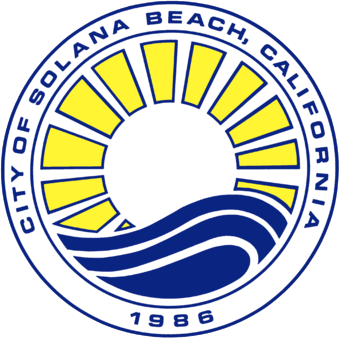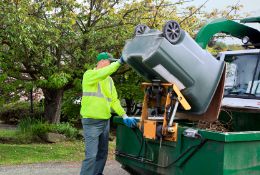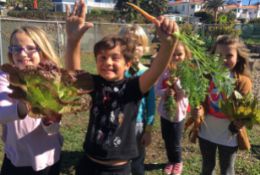- CITY SERVICES
- CITY PROJECTS
- RFPs & Construction Bids
- Annual Paving Project
- Fletcher Cove Access Ramp
- Glencrest Sidewalks
- La Colonia Park Master Plan
- Lomas Santa Fe Corridor Improvement Project
- Marine Safety Center Upgrade
- Neighborhood Traffic Management Program
- Playground Renovation Project
- Safe Routes To School
- Shoreline Project (Sand Replenishment)
- Glenmont Pocket Park
- Santa Helena Neighborhood Trail
- PERMITS, LICENSES & RENTALS
- RESIDENT SERVICES
- -ENVIRONMENTAL SUSTAINABILITY
Waste Diversion, Organics Recycling, and Food Donations
In the United States alone, 40% of food is uneaten, wasted, and thrown out. This results in an unfortunate misuse of resources needed to grow, process, and transport food while wasting money and accelerating climate changes.
The City's Climate Action Plan includes Pathway 3.3.4 Utilize Circular Economy & Enhance Food Systems. This pathway aims to divert solid waste from the landfill and ensure compliance with SB 1383 by increasing community-wide food waste awareness and education, alongside organics recycling accessibility and enforcement.
- SB 1383 Background
-
Senate Bill 1383 (Lara, Chapter 395, Statutes of 2016) passed in 2016, as part of California’s larger strategy to combat climate change and to redirect food that would be wasted to those who need it.
Organics like food scraps, yard trimmings, paper, and cardboard make up half of what Californians dump in landfills. Organic waste in landfills releases 20% of the state’s methane, a climate super pollutant 84 times more potent than carbon dioxide.
SB 1383 aims to reduce the amount of organic matter in landfills to reduce the amount of methane emissions generated and recover excess edible food to feed people in need. The following statewide targets need to be met:
- Reduce organic waste disposal 75% by 2025.
- Rescue for people to eat at least 20% of currently disposed surplus food by 2025.
Californians send 11.2 billion pounds of food to landfills each year, a lot of that food is edible for human consumption. In San Diego County, 1 in 4 residents are food insecure and do not know when or where their next meal is coming from. To reduce the amount of food waste and feed more Californians, SB 1383 requires certain food generating businesses to donate surplus edible food to food recovery organizations.
- SB 1383 Benefits
-
Recycling organic waste and recovering edible food is a fast track to fighting climate change and improving public health and the environment. There are many benefits if we successfully implement California’s super pollutant reduction strategy, including:

Environmental benefits, such as fighting climate change and improving air quality
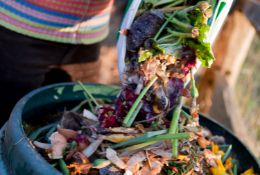
Less recyclable material in landfills

Millions of meals directed to the 1 in 5 Californians without enough to eat
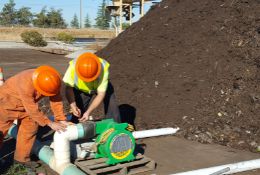
15,000 new permanent green jobs
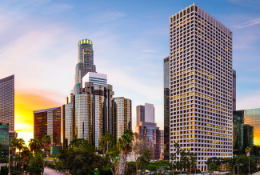
New recycled products like electricity from biomass conversion

Lowered greenhouse gas emissions equivalent to removing 869,920 cars off the road a year
- Organics Recycling
- The City's waste hauler, EDCO, allows customers to place food scraps in the green bin waste container. Here, the organic waste is recycled into valuable compost or mulch used in an organics recycling program for soil restoration. It can also be recycled by anaerobic digestion, producing nutrient-rich biofertilizer, renewable energy, and fuel. By recycling food waste, you extend valuable landfill space, which also reduces CO2 emissions and preserves our environment!

Learn more about how to recycle your organic waste and food scraps.
Jurisdictions Lead the Implementation of SB 1383
Implementation of SB 1383 is underway with the City of Solana Beach adopting Ordinance 517. Below are areas that the City is responsible for implementation and enforcement, including resources for residents and businesses to stay compliant.
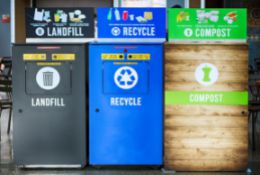
Conducting Education and Outreach to the Community
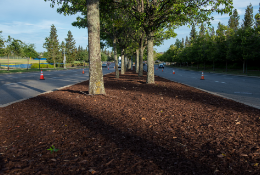
Procuring Recycled Organics Products
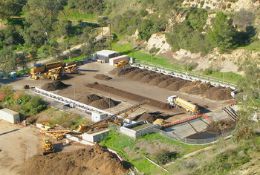
Securing Access to Recycling and Food Recovery Capacity
